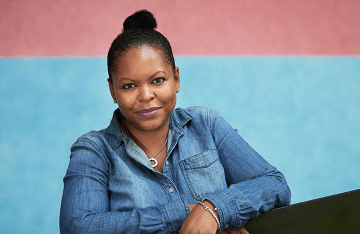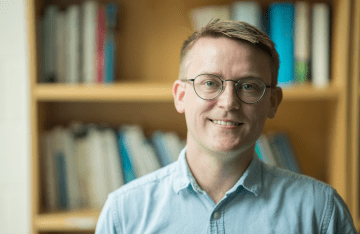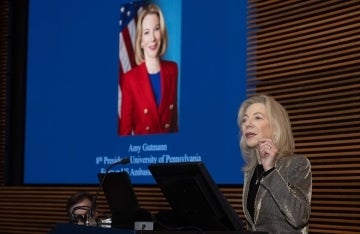The Annenberg Public Policy Center Hosts Society of Environmental Journalists Conference at Penn
In April, APPC hosted the annual conference of the Society of Environmental Journalists.
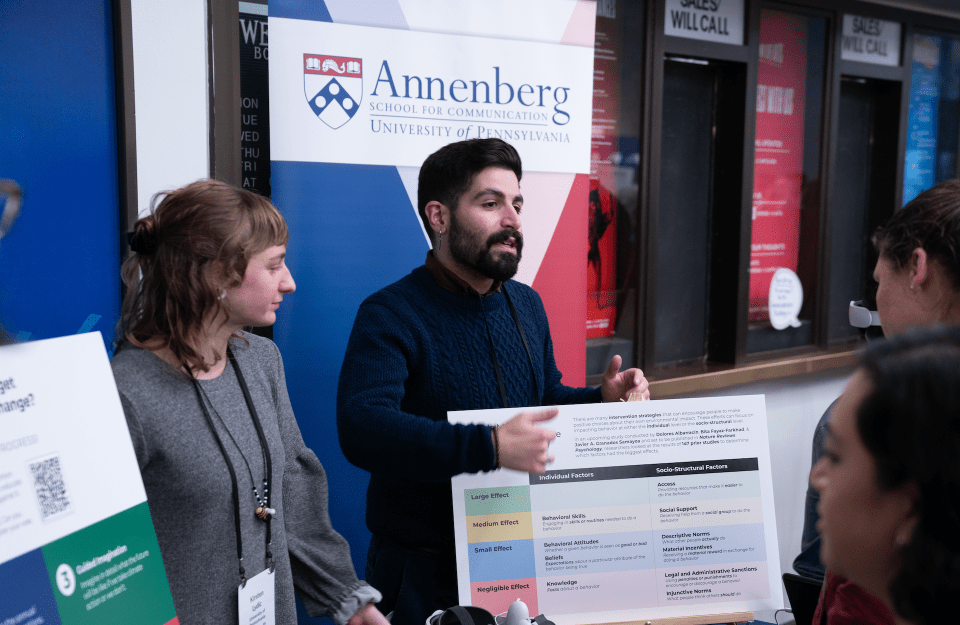
Communication Neuroscience Lab researchers Kirsten Lydic and José Carreras-Tartak talk to conference attendees about environmental research
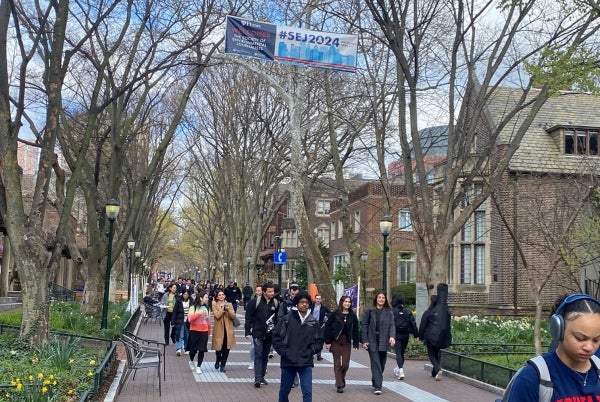
From April 3-7, 2024, the Annenberg Public Policy Center (APPC) hosted the annual conference of the Society of Environmental Journalists (SEJ), bringing the group of journalists from across North America to the University of Pennsylvania for #SEJ2024, focusing on the theme "Democracy, Disinformation, Activism… What’s Environmental Journalism’s Role?”
The conference, which drew over a thousand attendees to Philadelphia, not only showcased Penn faculty research in plenary sessions and workshops, but also made it possible for faculty and students take part in regional field trips.
The meeting, the SEJ’s first on the East Coast in several years, was hosted by APPC in honor of the Penn Center for Science, Sustainability, and the Media (PCSSM).
In an opening night plenary session on Wednesday, April 3rd, APPC director Kathleen Hall Jamieson and PCSSM director Michael Mann engaged in a conversation moderated by Rick Weiss, director of SciLine, a program of the American Association for the Advancement of Science.
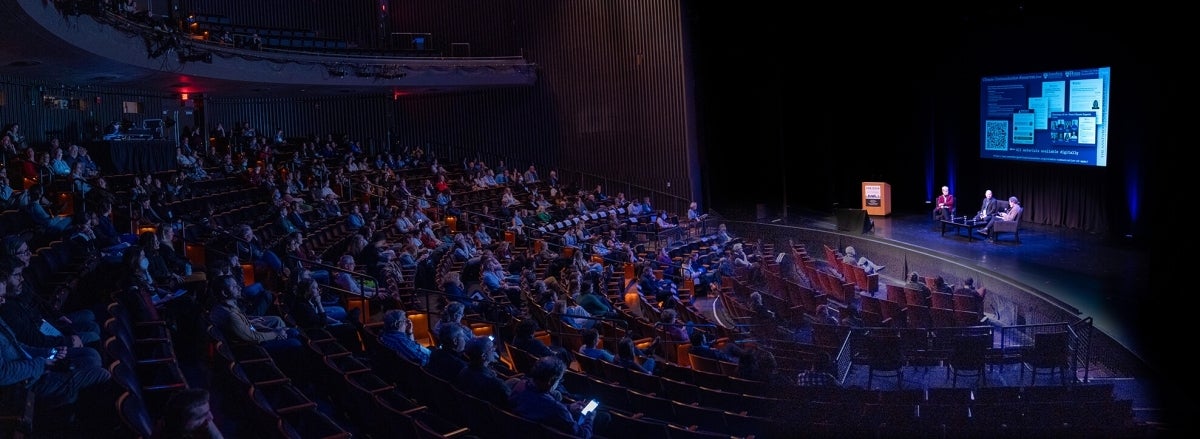
The plenary session also featured lightning-round presentations of the environmental work of six Penn faculty.
"Scan the QR Code!"
With QR code prominent on the screen behind her, Jamieson urged journalists at a lunchtime workshop and the evening plenary to connect with an APPC web page on climate communications that features an array of APPC and Penn resources.
These include APPC survey data finding that people who report having experienced extreme weather are more likely to support climate-benefitting policies; a fact sheet on SciCheck, a program of APPC’s FactCheck.org that focuses on false and misleading scientific claims; a directory of Penn faculty experts on climate; and the announcement of APPC’s new Climate Communication division, directed by Annenberg School for Communication psychologist and neuroscientist Emily Falk, who led an SEJ mini-workshop on crafting impactful environmental narratives.
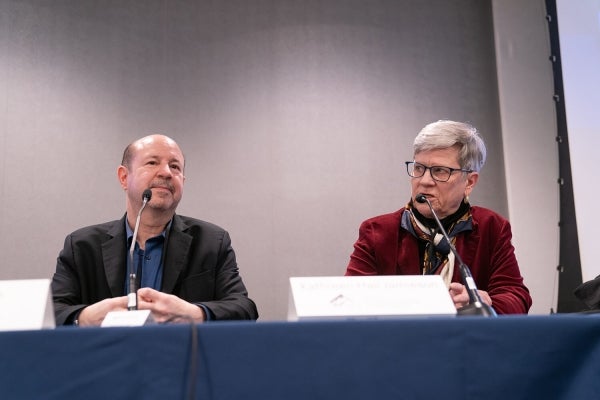
Also on Wednesday, as part of the SEJ’s daylong opening workshop on “Combating Climate and Science Disinformation,” Mann and Jamieson spoke at a lunchtime panel moderated by Weiss. In that forum, they discussed the communication landscape, climate science disinformation, and how to combat climate “doomism” – the belief it is already too late for action – and identified ways to effectively communicate with audiences about climate science.
Jamieson cited recent APPC survey data showing that trust in many institutions, including the National Aeronautics and Space Administration (NASA) and National Oceanic and Atmospheric Administration (NOAA), remains high. “We still have reliable sources to which we as a culture turn, even in the face of a highly polarized environment – not to find ‘truth,’ but to find the best available [information] that’s knowable by our best people using the best tested methods and regularly updated across time,” she said.
In response to those who claim that it’s too late to stop climate change, Mann stressed that “every bit of carbon that we don’t burn makes us better off.” Mann and Jamieson also took questions, including ones on the connection between attacks on democracy and attacks on climate scientists and how to respond to critics who claim that climate scientists are being influenced or “bought.” (Mann argued that while a small group of scientists may be influenced by fossil-fuel industry funding, the overall problem is almost the opposite, that “the scientific community has probably been overly conservative…with the way they’ve communicated the science to the public.”)
Disinformation and an Election Year
At the SEJ reception sponsored by APPC in the Feintuch Family Lobby of the Annenberg Center for the Performing Arts, Penn’s 12 schools staffed tables displaying their climate-related research. Also on display was work from PCSSM and APPC, the latter featuring SciCheck.
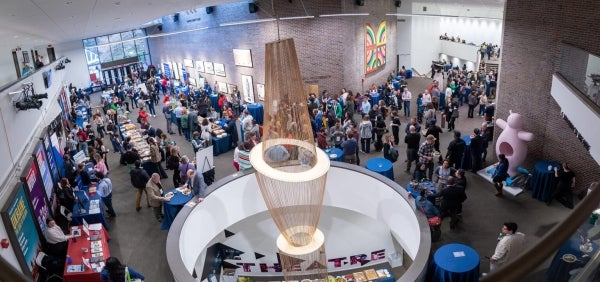
Following the opening day reception and dinner, the conference opened its first plenary session in the Zellerbach Theatre, where Penn’s vice provost for research, Dawn Bonnell, welcomed the group to campus. Then Jamieson and Mann were rejoined by Weiss, who asked about the role of journalism in combating mis- and disinformation — and its importance in an election year.
Weiss also asked Mann about his personal fight against disinformation.
In February, a jury awarded over a million dollars in punitive damages to Mann, who sued two conservative writers after they compared him and his work on global warming to a convicted child molester.
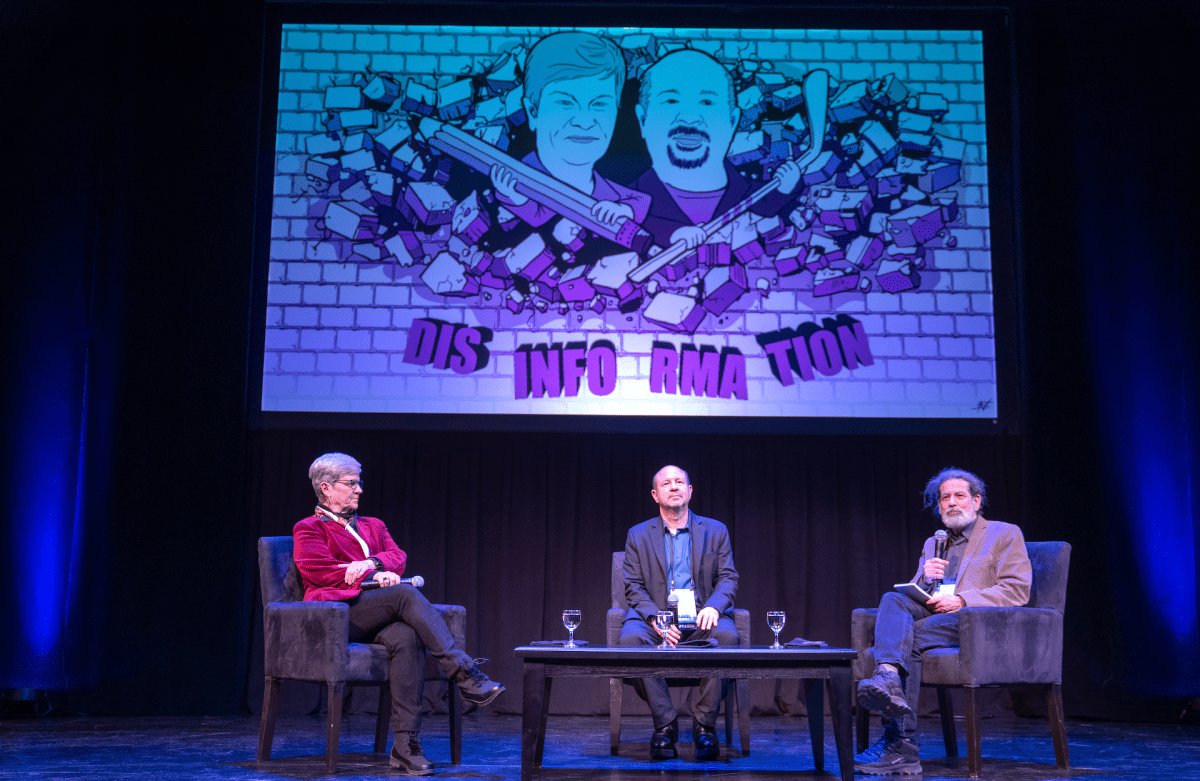
“Those of us in the climate science arena were introduced to the concepts of fake news and alternative facts decades ago before they became fashionable and part of our popular lexicon,” Mann said. “And in some sense, the bad faith debate that has existed for decades over human-caused climate change has sort of metastasized into this larger bad faith debate we have today over basic factual discourse. And so, there are some lessons to learn from what we have faced.…The two writers from these two organizations made defamatory allegations, accused me of fraud, compared me to a convicted child molester. You know, there is a role for good faith debate in science. It’s part of the self-correcting machinery that the great Carl Sagan described that keeps science on a path towards a better understanding of our world. But making false allegations about scientists, engaging in libelous attacks against them to discredit their science to advance a partisan or ideological agenda is not part of that good faith debate. At some point you need to draw a line. We felt it was important to draw that line when we were subject to these defamatory attacks 12 years ago."
Penn Faculty Take the Stage
After the discussion moderated by Weiss, Jamieson introduced a half-dozen Penn faculty for two-minute mini-talks on their research. The first, Jennifer Pinto-Martin of Penn Nursing, appeared on video discussing “Climate change and eco-anxiety,” on her research in the Galapagos and in the Eastwick neighborhood of Philadelphia. She was followed at the Zellerbach by:
- William W. Braham (Weitzman School of Design) on how “Efficiency will not solve climate change.”
- Dipti Pitta (Penn Vet) on “Microbiome medicine: toward sustainable livestock systems,” and seeking to lower methane emissions from livestock.
- Joseph S. Francisco (Chemistry) on atmospheric chemistry, and the effects of global warming on the stratosphere.
- Simon Richter (German), an environmental humanist and co-director of the Penn Animation as Research Lab, on how the Netherlands is coping with rising sea levels.
- Katie Barott (Biology) on the ecosystem of the coral reef, the largest biologically built structure on our planet, and why coral bleaching occurs.
For more photos and information about the event, visit the APPC website.

